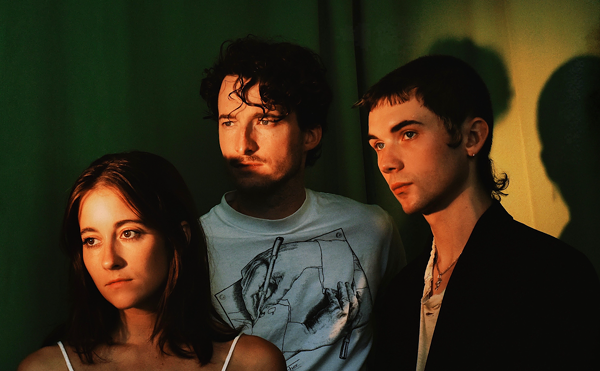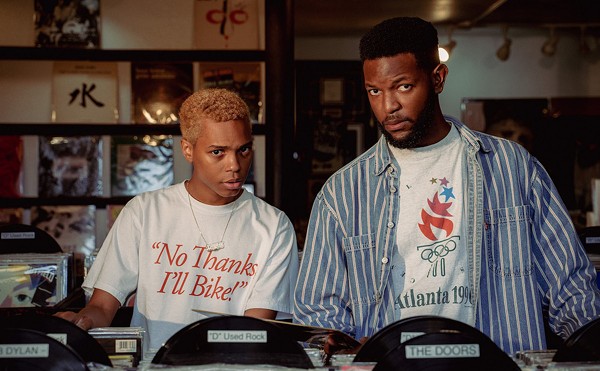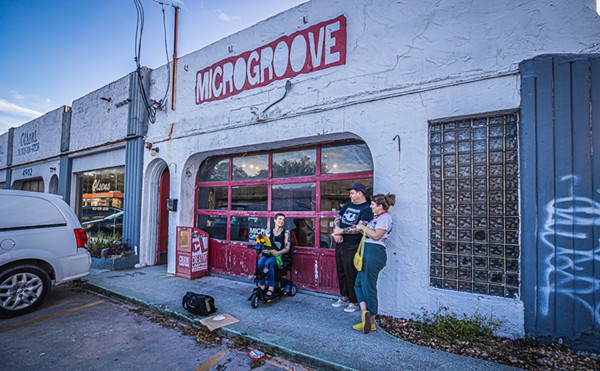Sonic Nurse
SONIC YOUTH
Geffen
After about a decade of more difficult, disparate and reaching work, New York City's godparents of alt return to the edgy-yet-accessible combination of discordant trash-art cool and judicious use of melody that marked their early '90s breakthrough. At least, that's what the first half of Sonic Nurse might lead one to believe. Even including a six-and-a-half-minute opening track that ends in an extended wash of feedback ("Pattern Recognition"), the disc's first five tunes uniformly comprise what is easily Sonic Youth's most immediately digestible run of material since Goo.
And, oh shit, they're good. Beginning with "Dude Ranch Nurse," the group, confident they've got your undivided attention, subtly introduce more challenging sounds into the mix; things peak with the oddly ordered cacophony of "Paper Cup Exit" before returning to comparatively straightforward stuff for the closing "I Love You Golden Blue" and "Peace Attack."
It wouldn't be fair to call Sonic Nurse a dumbed-down version of Sonic Youth — while the band is certainly and obviously experimenting with more traditional elements of songwriting and arranging, the disc is a good one. It's probably their most satisfying all-the-way-through listen since their Lollapalooza Generation mainstream heyday. Something about it is kind of strange, though: How in the world could noted avant garde producer/composer/ musician Jim O'Rourke join any rock band, and have them sound less weird as a result? 



—Scott Harrell
Live at Georgia Theatre
THE DEREK TRUCKS BAND
Columbia
Derek Trucks better not object to having his sextet called a jam band, because jam is far and away what they do best. The two-disc Live at Georgia Theatre proves this in spades. Virtually all of the song-like elements of this performance from October of last year are disposable, while the extended improvisational parts range from scintillating to, very occasionally, overwrought. Jacksonsville's Trucks, who started out as a pre-teen phenom getting his little tow-headed self hauled onto Florida stages, has developed into one of popular music's most extraordinary guitarists. He plays mostly slide, but has developed a way of factoring in single-note stuff that'll make your jaw drop. His band is a highly simpatico unit that locks with the ebbs, flows and whims of their leader (although I, for one, could do without Kofi Burbridge's flute, which is more a reflection of my distaste for flute than for Burbridge). DTB likes its jazz/rock-based sound spiced with Latin and other ethnic influences; most effective in this department is the expansive instrumental "Sahib Teri Band/Maki Madni," with its exotic, Middle Eastern feel. "Joyful Noise" takes its cue from closer to home; the funky tune unveils a middle section built from rousing, uptempo gospel (a la Robert Randolph). The set closes with a cover of "Freddie's Dead," with singer Mike Mattison giving up a credible Curtis Mayfield falsetto. This tune also has the effect, however, of pointing out how weak the other vocal melodies are. 


—ERIC SNIDER
The Slow Wonder
AC NEWMAN
Matador
Forget what you fear about terrorists slipping through our northern borders — AC Newman has already done it, and he's not stopping his onslaught until all of you have The Slow Wonder firmly lodged in your skull. The Vancouver native and de facto leader of The New Pornographers has written 35 minutes worth of what might be an hour-long effort for similarly talented artists — in other words, you get more of the sweet stuff in less time. The opener "Miracle Drug" starts with a beat that (I swear) resembles a slowed-down sample of Outkast's "Hey Ya!," and is no less infectious. Other tracks such as "Secretarial" and "On the Table" could've been outtakes from the Pornographers' Electric Version; the hallmarks of what made that group so justifiably hyped are evident here, too. The incisive wit, interplay of male and female harmonies (Neko Case is replaced by Sara Wheeler here), and the sheer likeability of Newman are undoubtedly part of the equation, though The Slow Wonder is far more personal than prior Pornographers outings. The disc is also somewhat less anthemic and more lyrically concrete. With jangly guitars, occasional forays into '70s new wave and '60s British Invasion, Newman has earned (along with The Shins) a spot as one of the Pacific Northwest's indie pop elite. If Newman is invading the U.S., you'd be better off surrendering now. 



—MARK SANDERS
Together We're Heavy
THE POLYPHONIC SPREE
Hollywood
Maybe the title refers to the actual combined mass of The Polyphonic Spree's 20-some-odd members; it can't be talking about the music, which is the very opposite of heavy in every meaning of the word, including the hippy-dippy one they're almost certainly really trying to invoke. When you strip away the matching robes, the ultimately extraneous members and the rest of the kitsch, what you're left with is a more orchestral but far more straightforward version of The Flaming Lips' airy, ambitious pop. Which isn't without its immediate-gratification charms ("Hold Me Now," "Two Thousand Places" and "Suitcase Calling" are highlights), but this sophomore effort's taffy-like song lengths and blandly pervasive off-Broadway-musical-inspired-by-an-animated-movie vibe quickly wear thin. Once you've culled a few uplifting piano-driven tracks to spice up various mix CDs, it's tough to imagine weathering the entire full-length on a regular basis. 
 1/2
1/2
—Scott Harrell
Action
JACKIE McLEAN
Blue Note/RVG Edition
In the '60s, much of the jazz world was polarized. You had the avant-gardists at one extreme, reinventing the idiom and shaking things up; on the other were the traditionalists, who thought the new vernacular was a mockery. Often left out of the historical debate are the tweeners — those musicians grounded in jazz convention but sympathetic to the pioneers and willing to adopt some of their ideas. They made some of the most interesting music of the period. Jackie McLean was among them, and 1964's Action is a superb example of post-bop getting dosed with a measure of experimentalism. Start with his alto sax tone, which has a tart flavor and a touch of the hue-and-cry that marked Ornette Coleman's sound. McLean wasn't given to screeches and squawks, but he did like to test the harmonic limits some. His compadres on this session — trumpeter Charles Tolliver, vibraphonist Bobby Hutcherson, bassist Cecil McBee and drummer Billy Higgins — share common sensibilities. Hutcherson, especially, lays out an engaging array of artful dissonances that adds unpredictability to the music. While most of Action revolves around swing grooves or ballads, the melodies have a dark angularity that sets them apart from standard bop fare. The result is music that's both challenging and ear-inviting — even 40 years later. 


 1/2
1/2
—ERIC SNIDER

















